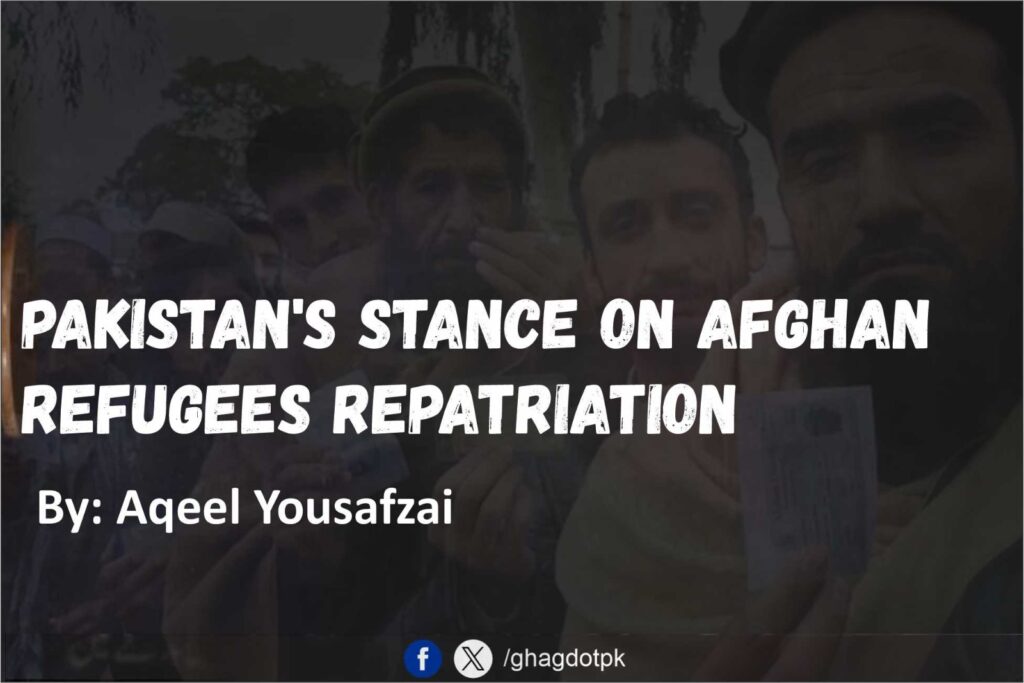Aqeel Yousafzai
Pakistan has been hosting millions of Afghan refugees since 1980 to date (2024), and even during Afghanistan’s relatively stable 20-year period, there was no significant decrease in refugee migration. In fact, despite improved security conditions and economic situation due to the presence of American and NATO forces, the refugee influx continued. In 1985, there were approximately 2.8 million Afghan refugees in Pakistan, which decreased to 2.4 million in 2005. This suggests that the voluntary repatriation process has been largely ineffective.
According to available data, there are approximately 800,000 registered Afghan refugees (cardholders) living in Pakistan, while around 700,000 are estimated to be residing in the country without proper documentation, meaning they are staying illegally.
In this regard, the UN High Commissioner for Refugees (UNHCR) chief, Filippo Grandi, visited Pakistan in the second week of July 2024, where he met with Prime Minister Shehbaz Sharif, Amir Muqam (federal minister for state and frontier Regions, Safron) and officials of the Khyber Pakhtunkhwa government. He also met with a representative delegation of Afghan refugees in Peshawar.
In response to his request, the Government of Pakistan announced that it would provide some concessions to Afghan refugees until June 2025.
Before this, in July 2023, the then-caretaker government announced that illegal Afghan refugees living in Pakistan would be repatriated, and the process began. This process has been ongoing, with ups and downs, and every week, hundreds and thousands of individuals are being sent back to Afghanistan through the Torkham, Chaman, Ghulam Khan, and Angoor Adda crossing points. To facilitate this, the UNHCR and the Government of Pakistan have established assistance centers at various locations. The UNHCR is also providing financial assistance to each individual and family, ranging from $300 to $700, to meet their basic needs.
The pace of their repatriation can be gauged from the fact that, according to reports, 637,427 individuals had been sent back by July 3, 2024. Another report states that between June 21 and July 3, 16,446 Afghan nationals, comprising 432 families, were repatriated in 496 vehicles.
Based on various reports, it can be said that since the decision to repatriate them was made, around 600,000 Afghan refugees have been sent back to their country, including approximately 150,000 who voluntarily returned despite having some required documents.
On the other hand, the interim government and some political circles in Pakistan, who are quick to criticize the country’s decisions, have failed to provide adequate support to the repatriated refugees or even basic facilities for temporary residence. Besides the Afghan interim government, former Pakistani Prime Minister Imran Khan and several nationalist leaders have also strongly opposed Pakistan’s decision to repatriate Afghan refugees, solely for political point-scoring. However, the government has not bowed down to pressure, as it has received information that many of these refugees are involved in criminal activities, smuggling, and money laundering, and some have even colluded with banned organizations like the Pakistani Taliban to carry out attacks in Balochistan and Khyber Pakhtunkhwa. Evidence has also emerged that hundreds of Afghan refugees and TTP supporters participated in the May 9 incidents and attacks. Moreover, data has revealed that thousands of Afghan refugees have not only obtained Pakistani passports and identity cards through bribery but have also started various businesses illegally, without paying taxes. The FIA and other sensitive agencies have taken action against dozens of government officials who facilitated these individuals.
Pakistan, while continuing to repatriate illegal Afghan residents, has also issued a record number of visas to approximately 150,000 Afghans, despite the challenges and security concerns that arose after the Taliban takeover in August 2021. These Afghans were seeking to escape the turmoil in their country and relocate to Pakistan or other countries. Notably, Pakistan is the only country that has issued the highest number of visas to Afghans, despite strained relations and anti-Pakistan propaganda, making it a unique exception in the world.
On July 10, 2024, a United Nations sub-agency released a monitoring report stating that the Afghan interim government and Taliban-backed TTP have become the largest terrorist organization in Afghanistan, with an estimated 6,500 fighters, according to the report. However, independent sources estimate the number to be around 15,000. Meanwhile, Pakistan has taken measures to combat cross-border terrorism, including the establishment and activation of the Land Border Authority to curb smuggling and other activities. In a significant briefing on July 12, it was revealed that Pakistan had conducted 22,714 intelligence-based operations in various regions, including Khyber Pakhtunkhwa and Balochistan, resulting in the killing of approximately 900 wanted terrorists, including dozens of Afghans.
The crackdown on Afghan refugees is not limited to Pakistan alone, as Iran, which hosts the second-largest number of Afghan refugees, has also intensified its deportation efforts. According to a global organization’s report, Iran deported over 1 million Afghan refugees in 2023, with hundreds losing their lives during various operations. In July, Germany also announced that it would tighten scrutiny of Afghan asylum seekers, revealing that numerous Afghan refugees were involved in criminal activities and terrorism, and were also promoting extremism in Germany.
In the context of the entire situation, despite some political circles’ pro-refugee policy and sympathy, most people agree that Pakistan has to take a tough stance on Afghan refugees, considering the political and economic conditions in Afghanistan, which would undoubtedly lead to severe difficulties for many if repatriated. This reaction is also being seen in the context of the unbridled social media campaign fueled by the Afghan interim government and Pakistan-opposed circles’ hateful propaganda. Another reason is that some relevant countries and global organizations have also adopted a policy of indifference and disinterest towards Afghan refugees, and as a result, Pakistan is not receiving the necessary support and assistance it needs to address the issue.






